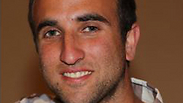
Eight years ago, Israeli rancher Chaim Zilberman reached breaking point. Thieves and marauders had been targeting his sprawling ranch at Moshav Zippori in the Lower Galilee - his land had been burned black and the cattle fences cut down. On the verge of bankruptcy, the rancher told his family during one Friday night dinner that he would no longer be able to hold onto the ranch.
His son, Yoel Zilberman, who had served in the IDF's elite naval commando unit, Shayetet 13, and who had fought in the Second Lebanon War, sprang into action. Enroled in an officer's training course at the time, Zilberman took leave to set up a guarding outpost on his father's land. A Bedouin family from a local tribe had been invading his family's territory for years, and had even threatened to murder Yoel's father, while slaughtering the family's cows - all without any police intervention.
"I took with me an Israeli flag, two mattresses, 40 books and set up camp on this secluded area of our ranch guarding the land from encroachers," says Yoel Zilberman, 30. "I told my dad that we were not going to abandon our land to criminals."
Zilberman, accompanied by army buddies and local friends, began to patrol some of the 5,000 dunams (approx. 1,200 acres) of his family’s ranch, driving away the thieves. He soon realized that land encroachment was not only his family’s problem, as other ranchers from the region reached out and asked him for help.
In 2007, Zilberman, along with On Rifman from the Negev established HaShomer HaChadash (the New Guard) to help farmers and ranchers in both Negev and Galilee guard their properties and maintain their farms; preventing arson and theft and strengthening farmers. Today, thousands of volunteers are part of the movement, undergoing intensive training, patrolling the land from observation posts strategically set up in the Negev and Galilee to guard farms when local law enforcement remains unequipped to do so.
A third generation Israeli rancher, Yoel Zilberman was born and raised in Moshav Zippori, a community whose residents were once mostly farmers. His grandparents came to Israel after the Holocaust and were the first founding couple of the moshav.
For Zilberman, HaShomer HaChadash is not only about protecting the land but also connecting to it.
“The younger generation of Israel today doesn’t understand the significance of our land,” says Zilberman. “They know all about Harry Potter, but nothing about (Labor Zionist leader) Berl Katznelson.”
“Over the years, we’ve had volunteers from all over Israel including secular Israelis from Tel Aviv and families from Jerusalem as well as volunteers from around the world, come to reconnect to the land, to the outdoors, to the history and heritage of our nation,” he explained.
“Guarding the land brings people of right and left ideologies together. The responsibility to help Israel’s farmers is bigger than politics,” he says. “Israel is a land of milk and honey, but honey and milk don’t simply grow on trees. It is something that man has to help make happen.”
Volunteering with HaShomer HaChadash involves not only helping protect farmers and their land, repairing vandalized areas and doing farm work, but also spending time learning Zionistic and Biblical texts related to the land. The organization now also has leadership pre-army programs for high school graduates.
“We are not a religious family but we were raised with very strong Zionistic values,” Zilberman tells Tazpit. He believes that "the personality of the Jewish people originated from the Land of Israel.”
“We lose our soul when we distance ourselves from the land. Our identity depends on the connection we share with this land,” he says.
Zilberman sees the Bedouin as part of Israeli society and knows many who are good neighbors to local farmers.
“It is always a minority that causes problems. There are many Bedouins in the area with whom we are very good friends, and have good relations. These Bedouins want to stop the criminal activity in their villages, caused by the same criminals who encroach on state land.”
“When Mark Twain visited the Galilee, he said it was desert. Today it looks like the Garden of Eden because of the farmers. Every Jew wants Israel to be a Garden of Eden for all, including for minorities.”
HaShomer HaChadash’s founder and CEO recently received this year's Moskowitz Prize for Zionism, an annual award given to those who put Zionism into action. Zilberman, who lives today in Kfar Adumim with his wife and children, was suitably modest.
“I am not one for prizes or awards," he says. "But it is important to be a role model for young people and show that real change can take place with hard work. That's the message I want to instill.”















